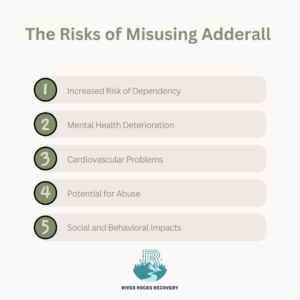Adderall is the most common prescription medicine often used to treat Attention Deficit Hyperactivity Disorder (ADHD) and narcolepsy. It has sparked interest due to its effects on energy and mood. Adderall, a potent stimulant known for improving attention, concentration, and productivity, has substantial effects on both the body and the brain.
Whether you’ve been prescribed Adderall or are simply curious about its effects, you should understand how it affects your energy and emotional well-being. So, let’s get into this post and learn how it impacts energy levels and mood.
What Is Adderall?
Adderall is a stimulant that contains two active ingredients: amphetamine and dextroamphetamine. These chemicals work by increasing the levels of certain neurotransmitters in the brain, such as dopamine and norepinephrine, which helps improve focus, attention, and alertness. However, the effects on energy and mood can vary from person to person, and misuse or dependency can develop, especially when Adderall is not taken as prescribed.
How Does Adderall Work?
Adderall is a powerful combination of two stimulants: amphetamine and dextroamphetamine. These chemicals influence neurotransmitters in the brain, particularly dopamine and norepinephrine. Dopamine, also known as the “feel-good” neurotransmitter, plays an important role in reward, motivation, and enjoyment. In contrast, norepinephrine regulates alertness, attention, and arousal.
When someone takes Adderall, these chemicals flood the brain, increasing activity in areas involved in concentration and impulse control. As a result, people frequently report feeling more focused, energetic, and relaxed. However, how Adderall affects each individual varies depending on their brain chemistry, dosage, and overall health.
Adderall Impact on Energy Levels
- Heightened Mental Energy and Focus
One of the most notable effects of Adderall is the significant boost in mental energy. Users often report feeling much more awake, alert, and focused, which can be particularly beneficial for those with ADHD. However, this increase in mental energy can sometimes come at the cost of physical restlessness or an overwhelming sense of urgency, especially in those who do not have ADHD. - The “Adderall Crash”
As Adderall’s effects begin to wear off, many people experience a sudden drop in energy levels, known as the “Adderall crash.” This period of extreme fatigue can make it difficult to function, leading some to misuse the drug by taking higher doses or using it more frequently. For individuals in recovery or those with co-occurring disorders, these energy crashes can be a trigger for substance misuse or relapse. - Disrupted Sleep Patterns
Since Adderall stimulates the central nervous system, it can make falling asleep difficult, even after the drug’s primary effects have worn off. Many users experience insomnia or a disrupted sleep cycle, which can lead to chronic exhaustion over time. This lack of quality sleep further exacerbates the energy crashes that follow Adderall use, creating a cycle of stimulant use and fatigue. - Overstimulation
While Adderall can increase focus and energy in small, controlled doses, excessive or long-term use can lead to overstimulation. This may result in physical jitteriness, excessive fidgeting, or difficulty sitting still. Overstimulation can also manifest as mental restlessness, where the user feels constantly “on edge” or unable to relax.
Adderall Effects on Mood
- Mood Elevation and Euphoria
In addition to boosting energy, Adderall can elevate mood, especially when taken in higher-than-prescribed doses. Some individuals experience feelings of euphoria, which is one of the reasons why Adderall is commonly misused. However, this elevated mood is often short-lived and can be followed by mood crashes, irritability, or even depression. - Increased Anxiety
While Adderall may initially improve mood and focus, prolonged use or high doses can lead to heightened anxiety. Some users may feel more agitated or easily frustrated. For individuals with pre-existing anxiety disorders, Adderall can worsen symptoms, leading to panic attacks, excessive worry, or tension. - Irritability and Aggression
Adderall misuse can lead to irritability and, in some cases, aggressive behavior. As the drug wears off, some individuals experience heightened irritability and emotional sensitivity, which can strain relationships and contribute to feelings of isolation or anger. - Depression and Mood Swings
After the stimulant effects of Adderall diminish, it’s not uncommon for users to experience mood swings or depressive episodes. This can be particularly challenging for those already struggling with mood disorders or mental health conditions. The swings between elevated moods while on the drug and feelings of despair once it wears off can lead to emotional instability.
Long-Term Effects on Energy and Mood
Consistent Adderall usage over time can affect the brain’s natural regulation of mood and energy. Some significant long-term consequences include:
- Increased dependency and more pronounced crashes.
- Can exacerbate mood swings or emotional stability.
- Can make you exhausted when you’re not on medication.

The Risks of Misusing Adderall
Though Adderall is a legitimate prescription medication for ADHD and narcolepsy, its misuse has become a growing concern. Many people without these conditions use Adderall to enhance productivity, stay awake longer, or improve academic or work performance. However, this non-prescribed use can lead to serious health risks, including addiction. Adderall misuse is particularly dangerous for individuals in recovery from substance use disorders, as the drug’s stimulant properties may replace one addiction with another.
- Physical Dependence: Regular use of Adderall can lead to physical dependence, where the body becomes reliant on the drug to maintain energy levels and focus. This can lead to cravings and compulsive use, even in the face of negative consequences.
- Mental Health Decline: Adderall misuse can exacerbate or trigger mental health disorders, such as anxiety, depression, or bipolar disorder. The drug’s impact on mood and energy makes it especially risky for individuals with a history of mental health issues.
Managing Adderall Use in Recovery
For individuals in recovery, managing Adderall use requires careful oversight from medical professionals. If you have been prescribed Adderall for ADHD or narcolepsy, it’s essential to work closely with your doctor to monitor its effects and adjust the dosage as necessary. Those in recovery should avoid self-medicating or increasing their dose without medical supervision, as this increases the risk of dependency and relapse.
At River Rocks Recovery, we understand the unique challenges posed by stimulant medications like Adderall. Our comprehensive addiction treatment programs are designed to help individuals address substance use disorders, co-occurring mental health conditions, and the underlying factors contributing to addiction. Whether you’re struggling with stimulant misuse or seeking support for recovery from other substances, our team is here to guide you every step of the way.
How to Manage Adderall Addiction? Get in Touch with River Rocks Recovery
Adderall can be a useful drug for those with ADHD, but it does have some negative effects on energy and mood. While it might provide an instant boost in attention, alertness, and even emotional well-being, it can also cause feelings of worry, anger, or exhaustion when its benefits wear off.
If you have major mood changes or energy swings while using Adderall, consult River Rocks Recovery, an addiction treatment center in Ohio. Our team of professional doctors ensures you are receiving the best treatment for your requirements. Give us a call right now at:(888) 905-6281 and find a new way to restart your life.
Our Programs Include:
- Addiction Treatment Programs: Customized treatment plans for individuals battling substance use disorders.
- Alcohol Rehab Treatment Program: Comprehensive care for those struggling with alcohol dependence.
- Drug Rehab Treatment Program: Focused treatment for individuals dealing with drug misuse, including stimulants like Adderall.
- Opiate Rehab Treatment Program: Specialized support for those recovering from opioid addiction.
- Partial Hospitalization Program (PHP): A structured treatment program that offers intensive care during the day while allowing individuals to return home in the evenings.
- Intensive Outpatient Program (IOP): A flexible treatment option that provides ongoing support while allowing individuals to manage daily responsibilities.
- Outpatient Treatment Programs: A step-down program designed to help individuals transition out of more intensive care while maintaining access to essential treatment services.
Conclusion
Adderall can have a profound impact on energy levels and mood, offering benefits for those with ADHD but posing risks when misused. Understanding these effects and the potential for dependency is critical, especially for individuals in recovery. At River Rocks Recovery, we are committed to helping you or your loved ones navigate these challenges, offering comprehensive addiction treatment programs that address both the physical and emotional aspects of recovery. Embrace the comprehensive care offered at River Rocks Recovery, and contact us today at (888) 905-6281.
FAQ on Adderall Affects Your Energy Levels and Mood
What is Adderall and how does it affect energy levels?
Adderall is a stimulant medication used to treat ADHD and narcolepsy. It boosts energy levels and alertness by increasing dopamine and norepinephrine levels in the brain, improving focus and concentration. However, improper use can lead to overstimulation, fatigue, and energy crashes.
Can Adderall cause mood swings?
Yes, Adderall can lead to mood swings, especially when misused. While it may initially elevate mood, prolonged use can result in irritability, anxiety, depression, and emotional instability, particularly in individuals with pre-existing mental health conditions.
What are the risks of Adderall misuse?
Misusing Adderall can lead to dependency, mental health deterioration, disrupted sleep patterns, and increased anxiety or irritability. It poses particular risks for individuals in recovery, as misuse may trigger relapse or substitute addiction.
How can I manage Adderall use safely?
To manage Adderall use safely, follow your doctor’s prescription, avoid increasing doses without medical advice, and monitor any side effects. If you have concerns about your Adderall use, seek support from addiction treatment professionals, such as those at River Rocks Recovery.
What treatment options does River Rocks Recovery offer for Adderall misuse?
River Rocks Recovery provides comprehensive addiction treatment programs, including partial hospitalization, intensive outpatient, and outpatient programs. We offer tailored support for individuals recovering from Adderall misuse or dependency, with a focus on long-term sobriety and mental health.

